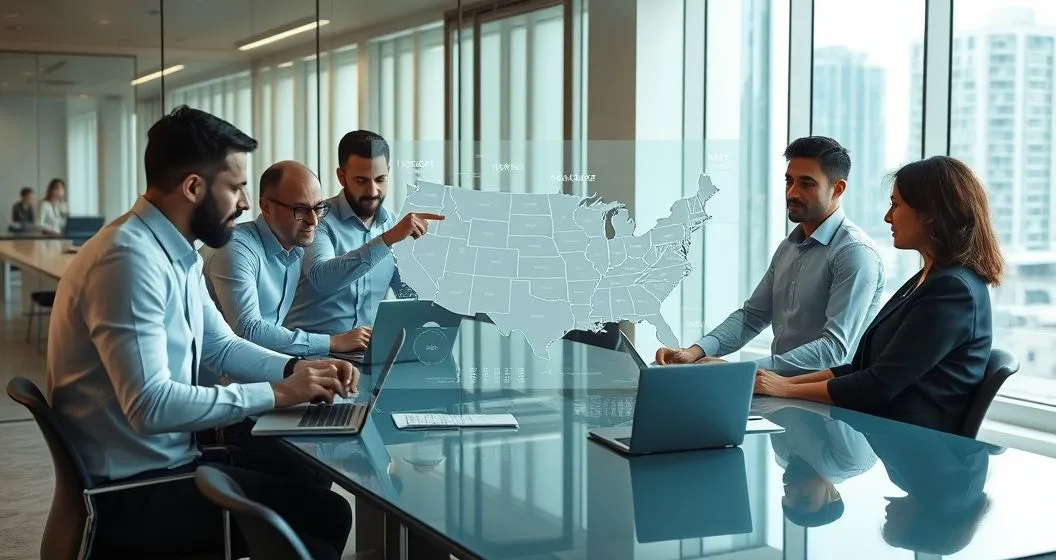Why this matters
States use nexus tests to decide whether a business has sufficient connection to impose tax obligations. For digital services and SaaS, small differences in where customers, servers, or contractors are located can create registration and collection duties — and potential back-tax exposure if ignored (U.S. Supreme Court, South Dakota v. Wayfair, 2018).
How nexus is commonly triggered for digital services and SaaS
- Economic nexus: Many states impose nexus when a remote seller exceeds a revenue or transaction threshold (examples include thresholds based on either dollar sales or number of transactions). The exact threshold varies by state; check each state’s statute or guidance (Tax Foundation; Avalara).
- Transactional thresholds: Some states tie nexus to a number of in‑state sales (e.g., 200 transactions in a year in some jurisdictions).
- Physical or attributable presence: Employees, contractors, sales reps, office space, or servers located in a state can create traditional physical nexus.
- Marketplace and platform rules: Marketplace facilitator laws may shift collection responsibility to the platform rather than the seller.
- Service classification: Whether SaaS is taxable depends on how a state characterizes it (taxable tangible personal property, a service, or exempt). Nexus plus a taxable classification triggers collection duties.
Key practical examples and legal backdrop
- The Wayfair decision (2018) enabled states to adopt economic‑nexus rules that do not require a physical presence; since then, most states enacted thresholds for remote sellers (South Dakota v. Wayfair, Inc., 2018).
- State approaches still vary: a state may tax SaaS directly, treat it as a nontaxable service, or apply use tax instead. That means two identical SaaS businesses can face different obligations across states (see Tax Foundation and Avalara guidance).
Who needs to pay attention
- SaaS vendors selling subscriptions to customers in multiple states.
- Digital service providers (cloud hosting, streaming, digital downloads) with remote customers, servers, or contractors in other states.
- Marketplaces and platform sellers covered by facilitator laws.
Quick compliance checklist (practical steps)
- Track sales and transaction counts by state monthly. Automated reports help identify thresholds early.
- Review each state’s definition of taxable digital products and SaaS — taxable status differs by state.
- Register and begin collecting sales tax in a state once you meet that state’s nexus threshold.
- Check marketplace‑facilitator rules: the platform may already be collecting tax.
- Run an annual nexus study or when you expand into new states.
- Consider voluntary disclosure agreements if you discover past unpaid obligations — they often reduce penalties and interest.
Tools and services
Tax automation or compliance partners (Avalara, TaxJar, or a CPA experienced in multi‑state sales tax) can reduce manual effort and limit errors; they also provide state‑specific sourcing rules and filings (Avalara; Tax Foundation).
Common mistakes to avoid
- Assuming physical offices are the only nexus trigger. Economic and marketplace rules commonly create nexus now.
- Treating SaaS the same in every state — taxation of digital services varies by state law and administrative guidance.
- Waiting to act: voluntary disclosures are more favorable than leaving liabilities unaddressed.
Short real-world note
In my practice I’ve seen SaaS firms unaware that subscription revenue to customers in multiple states quickly created economic nexus. After running a nexus study and registering in affected states, many were able to limit penalties through voluntary disclosures and timely remittances.
Authoritative resources
- South Dakota v. Wayfair, Inc., 585 U.S. ___ (2018) — U.S. Supreme Court decision authorizing economic nexus.
- Tax Foundation — state-by-state analyses of nexus and sales tax policy (https://taxfoundation.org).
- Avalara — practical guides to state nexus rules and SaaS taxation (https://www.avalara.com).
Related FinHelp guidance
- Navigating state tax nexus for subscription models: Navigating State Tax Nexus for Subscription-Based Businesses
- Avoid common SaaS pitfalls: Avoiding Sales Tax Nexus Traps for Digital Products and Subscriptions
- State-specific filing guidance and practical tests: State Sales Tax Nexus for Remote SaaS Companies in 2025
Professional disclaimer
This article is educational and does not constitute tax or legal advice. For guidance tailored to your business and the latest 2025 state rules, consult a licensed tax advisor or state tax authority.



